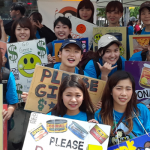Service Learning Program

Matching UHM’s Institutional Learning Outcomes, one of HELP’s Program Learning Outcomes is for students “to demonstrate personal development . . . (by) participation in activities with the larger community both on and off campus.” Service Learning is one way to fulfill this outcome and it is required of all HELP students.
What is Service Learning?
Service Learning is a method by which students learn and develop through active participation in thoughtfully organized service that is conducted in and meets the needs of a community.
How will Service Learning help me learn more and develop skills?
Service-Learning will help you to:
- discover the connection between your classroom studies and the real world
- gain experiences and possible career skills that will enhance your resume
- develop writing, critical thinking, and problem-solving skills
- learn how to communicate across cultures and generations
What is the difference between Service Learning and Volunteering?
Volunteering is thought of as providing service within a community for no financial or monetary gain. Service Learning, on the other hand, is similar to volunteering, but it gives students a chance to share their service experience with others through “reflection.” Reflection of one’s service not only involves sharing what you did, but more importantly allows you to “look back at what you did and to think critically about what you learned and gained from the experience.”(1)
(1) http://dwighthall.org/sites/default/files/files/reflection_tools.pdf
What kind of community service is available for students to perform?
HELP offers a select amount of service opportunities for the students, such as volunteering at non-profit organizations (NPOs), interacting with seniors at a day-care center, helping at athletic events (e.g. bicycle races), etc. As a language learner, you are here to improve your speaking and listening skills. However, volunteering may not always provide a chance for you to use English 100 percent of the time. Because of this, YOU are encouraged to speak up and take initiative during your service assignments and also be an active listener. Remember, people outside of HELP do not know your language abilities, so show them what you can do.
How many hours of service is required?
Every student is required to serve a minimum of six hours during an 8-week term [short-term students serve 3 hours of service]. HELP encourages students to serve more than the required amount of hours in order to gain as much volunteer experience as possible.
What proof of the hours of service can I show to other educational institutions or an employer?
At the end of each term, your service-learning assignments and hours will be listed on your grade report. We can also provide a certified letter of your assignments and a certificate of your service learning hours upon request.
How does the service program work?
Follow the three (3) steps in completing the service-learning requirements:
1. Choose an Agency
During the first week of the term, select a service learning assignment that suits your interest, matches what you study in school, etc. If you have any questions about these options, please speak with the Service Learning Coordinator. All HELP students must fulfill a minimum of 6 hours of service learning during 8-week terms (3 hours for shorter terms). After the first-time sign-up, sign up for more hours throughout the term in the Service Learning office during the term.
2. Provide Service
As representatives of HELP, it is your responsibility to provide the best service you can while volunteering. It is important for YOU to work independently and show others that you have the confidence to handle whatever tasks are given to you.
3. End-of-Term Responsibilities
At the end of the term, you will be required to provide reflection of your service through:
- writing a Reflection Essay explaining your volunteer experience.
- filling out on online survey.
Read more about the Service Learning program and how to sign up here:
[ Service Learning Program Introduction and Instructions (Updated Fall 2016) ]
EXAMPLES OF SERVICE LEARNING OPPORTUNITIES
*Hawaii Bicycling League (HBL)
[Levels Allowed: 200-400]
HBL’s ‘Mission’ is to enable more people to ride bicycles for health, recreation, and transportation through advocacy, education, and events. Each year HBL hosts several large events, like the Honolulu Century Ride and Haleiwa Metric Century, and also hold numerous smaller events such as Bike Month and Oahu Bike Count. As Oahu’s oldest and largest cycling organization, Hawaii Bicycling League has a strong voice with local and state agencies. We advocate for positive changes that will help make Hawaii a cycling paradise and encourage more people to ride bicycles.
Tasks: Volunteers will perform various tasks for some of HBL’s special annual events, such as the Haleiwa Metric Century Ride and the Honolulu Century Ride
*Hawaii Foodbank
Hawaii Foodbank – Volunteer Opportunities
[Levels Allowed: 200-400]
- (April/May) The Commodity Supplemental Food Program (CSFP) (a brand new program by the USDA) – Hawaii Foodbank is one of only 7 in the nation that’s been chosen to participate. Because our seniors, age 60 and older, are a large segment of the population affected by hunger, due to living on fixed incomes and having rising medical costs, this program helps supplement their monthly groceries with healthier choice food items than they might otherwise have the opportunity to buy.
- (April) Official Food Drive Day/Bag Up Hunger
- (December) Ward Village Trolley Elves
[Required: Application Form ]
*Ka Papa Loʻi o Kanewai
[Levels Allowed: ALL]
First Saturdays are open to anyone in the community looking for an opportunity to experience traditional farming methods, converse with Hawaiian Language speakers, talk story with practitioners, kuʻi ʻai, kuʻi ka imu, and enjoy the day with family and friends.
Tasks: Volunteers will ‘malama’ (care for) the loʻi (taro patch) by clearing and preparing the loʻi, Assist the staff with cleaning the kalo or taro, or help clear out Manoa Stream.
[Required: Waiver form]
*Lunalilo Home
[Levels Allowed: 200-400]
Established by the trust of King William Charles Lunalilo, the sixth reigning monarch of Hawaiʻi, Lunalilo Home’s mission is to provide respectful, quality, compassionate and caring services for disadvantaged kupuna of Hawaiian ancestry. Today, we serve kupuna of Hawaiian and non-Hawaiian ancestry in a beautiful ʻohana setting.
Tasks: Volunteers will assist the ADCC staff with activities, games and conversations with the kupuna at the Adult Day Care Center.
[Required: Orientation with Director of ADCC]
SPECIAL EVENTS
*Great Aloha Run
[Levels Allowed: 200-400]
About the Great Aloha Run: This 8.15-mile relatively flat course stretches from the historic Aloha Tower in downtown Honolulu to the Aloha Stadium. Along with promoting fitness and healthy lifestyles, the Great Aloha Run also raises money for many of Hawaii’s charitable organizations, raising more than $13 million since it began in 1985. Participants are invited to compete in a variety of divisions, including Elite Runners, Military (Active Duty, Reserve, National Guard and family members), Sounds of Freedom (troops running in formation), Competitive Wheelchairs and Handcycles, Presidents’ 100 Club, Lucky 7 and Walking Strollers.
Tasks: Volunteers will assist with tasks such as ‘packet assembly’ or ‘packet distribution’ at the GAR Expo.
[Required: Application form]
*Japan-America Society of Hawaii (JASH) – Wizard’s Competition
[Levels Allowed: 200-400]
Japan Wizards Competition is a challenging, fun-filled academic team competition for Hawaii’s high school students that tests students’ general knowledge of Japan and Japan-related fields. The competition is sponsored by the Japan-America Society of Hawaii (JASH), a nonprofit, nonpartisan, 501 (c)(3) tax-exempt organization with the mission of promoting understanding and friendship between the peoples of the United States and Japan through the unique and special perspective of Hawaii.
Tasks: Volunteers will work in the Activity Center and keep the student competitors occupied with activities in-between the competition.



